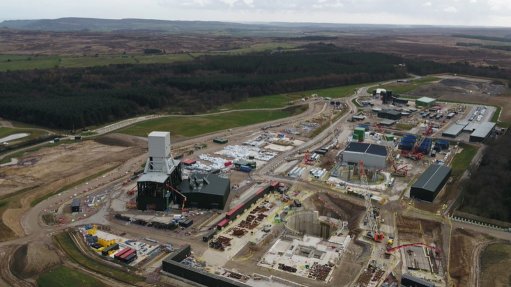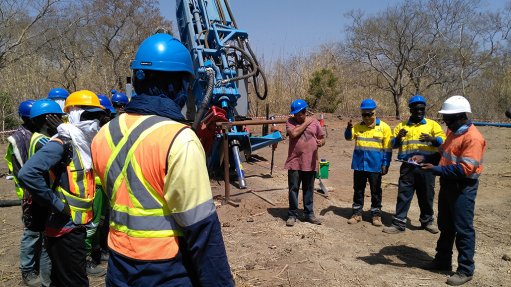CCUS and gas has big role in net zero - study
PERTH (miningweekly.com) – While new analysis has highlighted the need for natural gas and large carbon capture utilisation and storage (CCUS) in Australia’s race to net zero, there will be very little space for nuclear power.
The Net Zero Australia project has released its final modelling results of pathways to net zero, informing the national debate on a diverse range of pathways to reaching emission targets.
Net Zero Australia is a partnership of the University of Melbourne, the University of Queensland, Princeton University’s Andlinger Center for Energy and Environment, and Nous Group – and is supported by gifts and grants from various sponsors and has received input from a diverse Advisory Group.
Melbourne Energy Institute at the University of Melbourne director Professor Michael Brear says the modelling shows Australia will need all viable options to transform its energy system at an unprecedented pace and scale.
“Renewables and electrification, supported by a major expansion of transmission lines and storage, are keys to net zero,” Brear saiys.
“But we will need an all-technology, hands-on-deck approach. That includes a large increase in permanent carbon storage, deep underground and in vegetation, and a doubling of gas-fired power capacity to support renewables and energy storage.
“Our modelling finds that there would be no role for nuclear energy unless costs fall sharply (to around 30% lower than current international best practice) and renewable energy growth is constrained.”
University of Queensland Chemical Engineering Associate Professor Simon Smart, says that Australia has a global responsibility and economic incentive to transition coal and liquefied natural gas (LNG) exports to clean commodities.
“Hydrogen made from solar, wind and desalinated water can replace our fossil fuel exports. We can also export large volumes of clean hydrogen with large-scale implementation of carbon capture and storage,” Smart said.
“Exporting green metals, particularly iron and steel made in Australia using clean hydrogen, has much lower abatement and infrastructure costs than for exporting clean hydrogen.
“Northern Australia, including Western Australia, Queensland and Northern Territory, is particularly prospective for exports, but inland New South Wales and South Australia and offshore Victoria and Tasmania can also play major roles.
“Our modelling also suggests that new gasfields may be needed to fulfil export demand for clean hydrogen, particularly if the growth in renewable construction rates hits limits.”
Dr Chris Greig, senior research scientist at Princeton University’s Andlinger Center on Energy and Environment, says that around $7-trillion to $9-trillion of capital will need to be committed to domestic and export energy and industrial infrastructure by 2060, which is up to six times the business-as-usual amount.
“Additional investment will be needed by households and businesses, to increase the efficiency of their heaters and vehicles, including by converting to heat pumps and electric vehicles,” Greig says.
“The annualised cost of that investment in energy production, transport and use has been estimated at 8% to 9% of GDP to 2050, which is similar to today’s level.”
The Australian Petroleum Production and Exploration Association (Appea) has welcomed the findings, saying it echoed those from the International Energy Agency (IEA) and Intergovernmental Panel on Climate Change (IPCC).
“The analysis finds that even with unprecedented roll-out of renewable energy, gas power generation capacity will need to double by 2050 to keep the lights on and businesses operating,” Appea CEO Samantha McCulloch says.
“Natural gas will also be needed to power industry and manufacturing and to generate low-carbon hydrogen in conjunction with CCUS.”
She says that the report highlights the need for Australia to establish a large CCUS industry to address emissions from hard-to-abate industry and for carbon dioxide (CO2) removal – generating negative emissions.
“The report is clear, to meet net zero, Australia needs CCUS, and a lot of it. None of the scenarios considered can achieve net zero without CCUS,” McCulloch says.
“The oil and gas industry has called for a national CCUS roadmap to provide clear policy direction, progress carbon management hubs and promote Australia as a regional CO2 storage leader. The report shows that government leadership on CCUS is needed as a matter of urgency.”
McCulloch says that if renewables deployment can not reach the levels outlined in the findings, the role for gas with CCUS in power generation will be even greater.
“CCUS deployment would increase from 150-million tonnes CO2 a year to 1 000-million tonnes CO2 per year in 2050, and LNG exports would increase to multiple times of current levels.
“All technologies will be needed if we are to reach our climate change targets while minimising the cost-of-living impact for Australian households and businesses and keeping our manufacturing sectors competitive. The analysis finds that reaching net zero will require $7-trillion to $9-trillion of capital investment to 2060 with capital costs highest in scenarios where the use of gas and CCUS is restricted.”
Comments
Press Office
Announcements
What's On
Subscribe to improve your user experience...
Option 1 (equivalent of R125 a month):
Receive a weekly copy of Creamer Media's Engineering News & Mining Weekly magazine
(print copy for those in South Africa and e-magazine for those outside of South Africa)
Receive daily email newsletters
Access to full search results
Access archive of magazine back copies
Access to Projects in Progress
Access to ONE Research Report of your choice in PDF format
Option 2 (equivalent of R375 a month):
All benefits from Option 1
PLUS
Access to Creamer Media's Research Channel Africa for ALL Research Reports, in PDF format, on various industrial and mining sectors
including Electricity; Water; Energy Transition; Hydrogen; Roads, Rail and Ports; Coal; Gold; Platinum; Battery Metals; etc.
Already a subscriber?
Forgotten your password?
Receive weekly copy of Creamer Media's Engineering News & Mining Weekly magazine (print copy for those in South Africa and e-magazine for those outside of South Africa)
➕
Recieve daily email newsletters
➕
Access to full search results
➕
Access archive of magazine back copies
➕
Access to Projects in Progress
➕
Access to ONE Research Report of your choice in PDF format
RESEARCH CHANNEL AFRICA
R4500 (equivalent of R375 a month)
SUBSCRIBEAll benefits from Option 1
➕
Access to Creamer Media's Research Channel Africa for ALL Research Reports on various industrial and mining sectors, in PDF format, including on:
Electricity
➕
Water
➕
Energy Transition
➕
Hydrogen
➕
Roads, Rail and Ports
➕
Coal
➕
Gold
➕
Platinum
➕
Battery Metals
➕
etc.
Receive all benefits from Option 1 or Option 2 delivered to numerous people at your company
➕
Multiple User names and Passwords for simultaneous log-ins
➕
Intranet integration access to all in your organisation


















